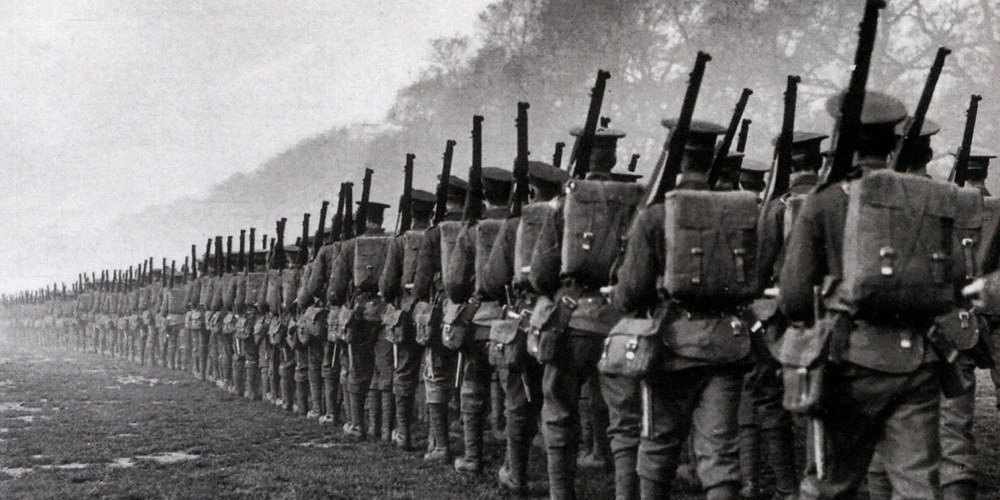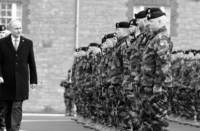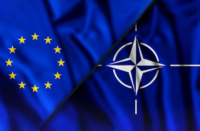As recent announcements indicate, both the European Union and the British government have markedly oriented public spending policies towards militarisation. The North of our island has been a direct recipient of such expenditures, notably Thales in Belfast.
Military expenditure historically plays three important roles in capitalist societies: it protects the international capitalist system from external threats; maintains the imperial hegemony of core states over peripheral countries; and shores up capital accumulation. Concerning the latter, Rosa Luxemburg argued, “from the purely economic point of view, [military expenditure] is a pre-eminent means for the realisation of surplus value; it is in itself a province of accumulation”. Leveraging state-led military expenditures to bolster economic growth, has featured when private investment and consumption weaken in capitalism e.g., the aftermath of the Great Depression. While Keynesian economic policies focus on state intervention to spur demand through public works and social spending, “Military Keynesianism” channels this intervention into arms production, war preparedness, and military expansion.
Yet this third role has not always been emphasised in Marxism. Engels once proposed that military expenditure had no positive impact on the economy because armies were “devilishly expensive.” Soviet economists argued such expenditure benefited only a cabal of monopolists at the expense of the civilian economy (see Tsagolov, 1985, War is Their Business). In contrast, Baran and Sweezy maintained that militarism absorbed the surplus while boosting total demand, thereby increasing the profit rate. Kidron argued that by counteracting the permanent threat of overproduction, the “arms economy” was much more efficient than civilian government expenditure at preventing the economy from overheating as it did not compete with capitalist interests. Yet while Baran, Sweezy and Kidron’s views have merit, one should not downplay the contradictory effects such expenditures have on the capitalist class in total via tax, interest rates and inflation. The value of military expenditure may be contingent on prevailing rates of profit and which leading faction of the capitalist class benefit the most. The multiplier effect of defence spending may be weaker than sometimes imagined. Adem Elveren in his 2019 The Economics of Military Expenditure: A Marxist Perspective shows that military expenditure increases the profit rate when the latter is low but has no such effect if the profit rate is already high.
That aside, the ideologues of capitalism are now arguing for Military Keynesianism which they see as a way to boost economic growth end stagnation (see “How to respond to the realities of a more dangerous world”, Financial Times, 3rd March 2025[1]; “A New Hope for Europe’s Ailing Economies: the Military”, Wall Street Journal, 13th March 2025[2]). Yet even if military expenditure may counter stagnation or recessionary tendencies – and even if it induces technological innovation – it does so in a way that highlights capitalism’s inefficiencies, its reliance on artificial demand and its inability to generate stable, productive growth through peaceful means.
There are no reasons why the oft-highlighted outcomes of past Military Keynesianism – like radar, semi-conductors and the Internet to take but three examples – could not be achieved under well-funded, free-floating scientific endeavours independent of a military-industrial complex. Furthermore, the output of military expenditure is non-productive: labour resources are allocated to instruments of destruction. Unlike investment in infrastructure, renewable energy or education, missiles, tanks, and warships do not in any direct sense contribute to further economic expansion. The opportunity cost is enormous. Investments in renewable energy, medical research, or public transportation would yield far greater long-term benefits. In an immediate sense, high military expenditure crowds out social spending.
Of course, Communists are not opposed to defence expenditures in all cases. Such expenditures are legitimate when they defend the borders of a community from real aggression or when protecting the socialised property of the working people: although even here Communists have learnt historic lessons on how military expenditures to defend socialist gains paradoxically drain resources from productive use in the socialist economy.
Military expenditures are clearly not legitimate when enabling state-monopoly capitalist elites to bolster a flagging and dysfunctional economic system and to project imperialist ambition abroad. Where such expenditures are designed to rejuvenate a stagnant capitalism across Europe, then it is not enough to argue for a reallocation of military budgets back to social spending, but rather to break from an economic structure that would engender such irrational misallocations of social wealth in the first instance.
REFERENCES:






